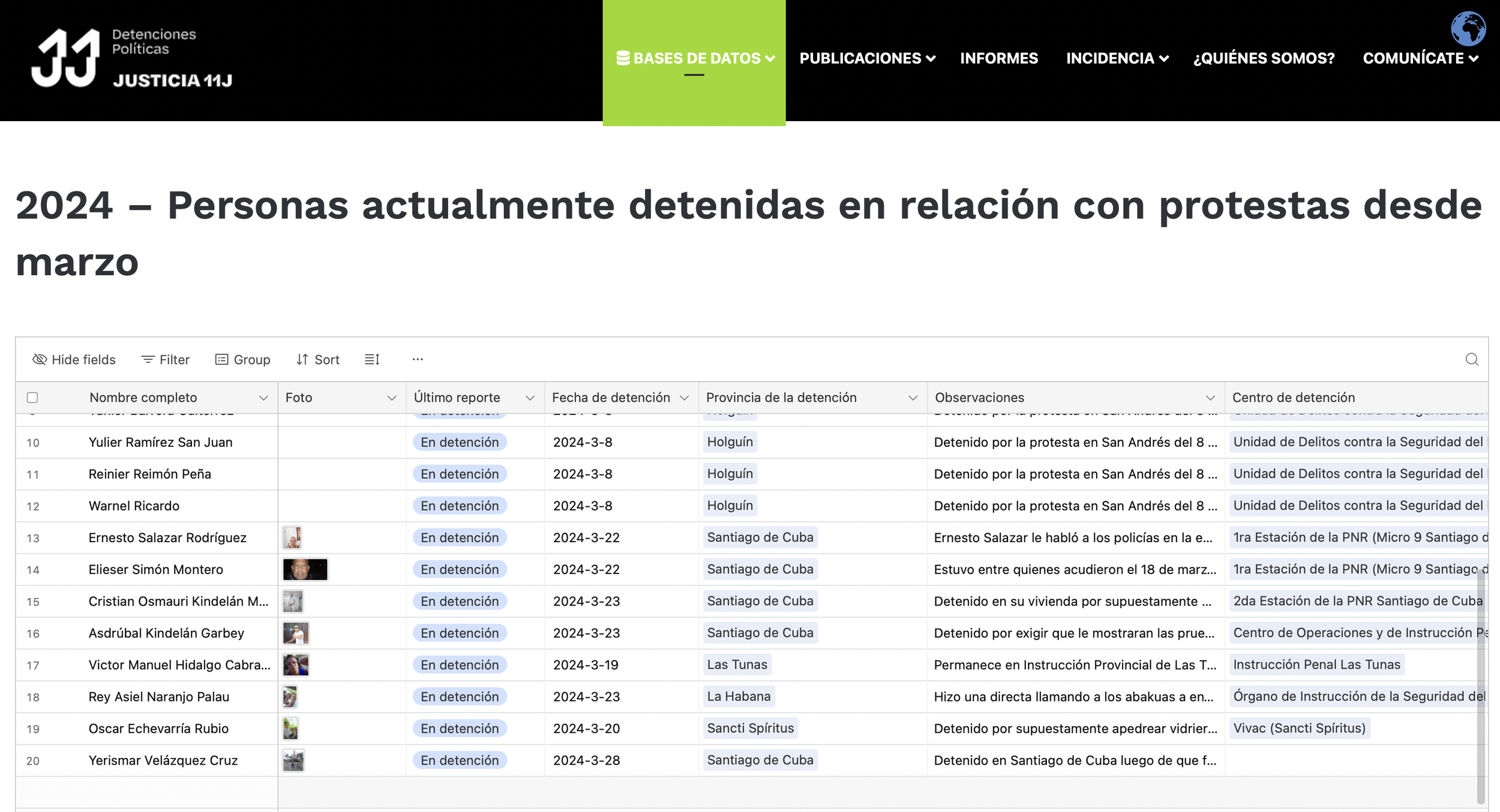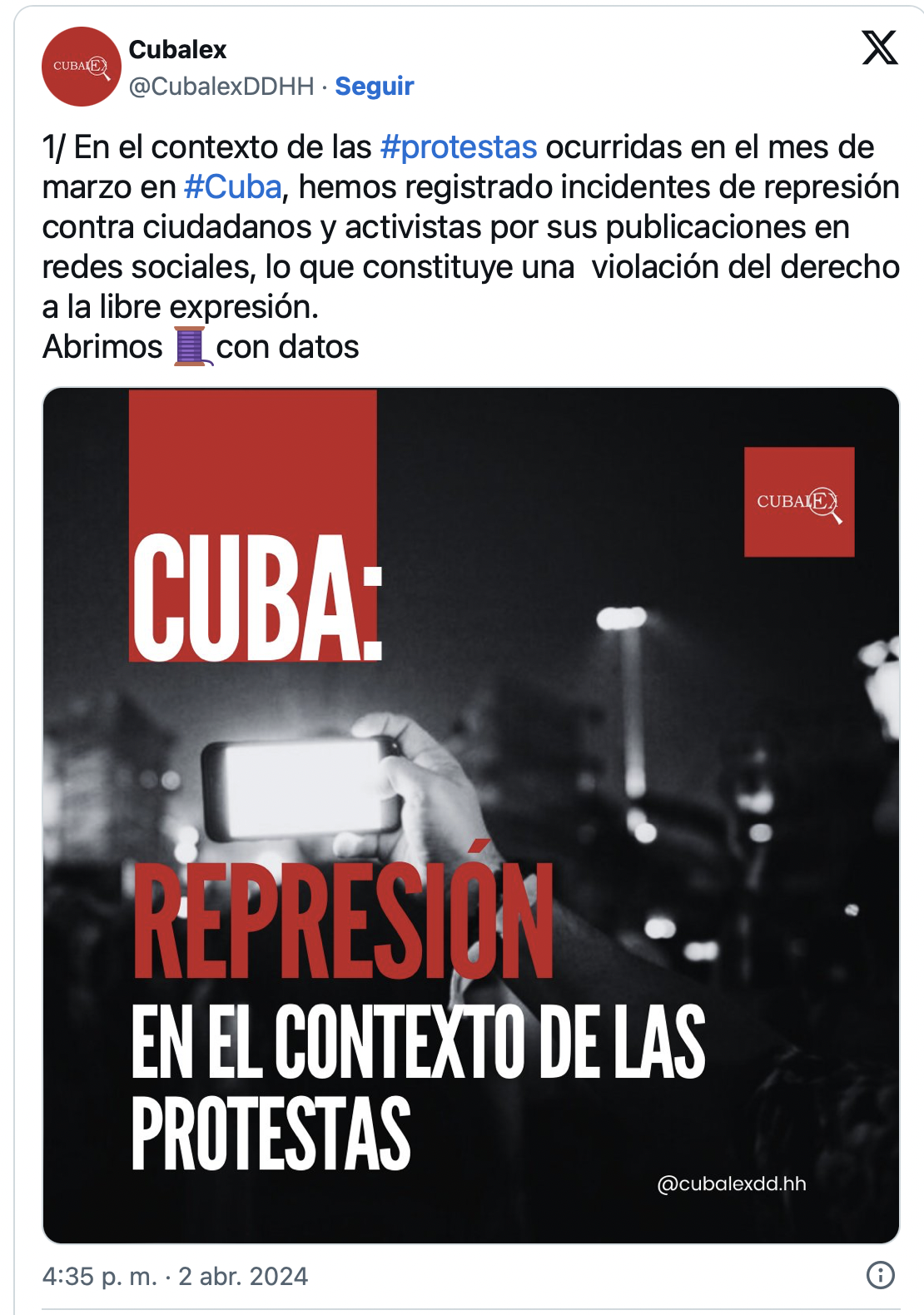Cuba's March 2024 Crackdown
Following the protests from March 16th to 18th in various parts of Cuba, the Cuban regime responded with several tactics. Initially, it aimed to confuse the international public opinion by supposedly respecting the right of individuals in Santiago de Cuba to protest on the streets on March 17th and 18th. This was followed by the historical practice of denigrating dissenters in official media outlets.
For instance, the newspaper Sierra Maestra, in its article "No One Can Take Away Our Peace," published on March 23, 2024, referred to the protesters as "pitiful people," "young and strong guys who neither study nor work," "loitering around corners, living off illicit business, inventing, with bulging pockets, drinking rum or beer at 9 in the morning or 6 in the afternoon; these parasites of our society, who receive equal benefits as the working people, thanks to the kindness of a Government they discredit, deserve the rejection of the people."
As has been the case for the past 65 years in Cuba, political violence finds its origin in the language and official discourse of exclusion, intolerance, and hatred towards dissent. Backed by this intolerant and hate-filled discourse towards those who think differently, repression was swift.
In March 2024, Cuba witnessed a significant surge in repression. According to the latest report dated April 4, 2024, by the Cuban Observatory for Human Rights, there were 374 repressive incidents recorded during the month, marking an increase of 92 compared to February. Among these incidents, 119 were arbitrary detentions. Notably, the majority of those detained were women, accounting for 74 cases, while 45 men were also affected.
Regarding repression against protesters during the March 17th and 18th demonstrations Holguín, Santiago de Cuba, Havana, Artemisa, Cienfuegos and other provinces,. reports from various. human rights organizations suggest the following:
Initially, as of March 28th, the group on arbitrary detentions, Justicia 11J, reported at least 19 detainees linked to the protests on march 17 and in subsequent days.
On March 30th, the NGO Prisoners Defenders (PD) reported that it verified the detention of 41 people in Cuba following the protests on March 17th, of which six were subsequently released. The provinces of Holguín and Santiago de Cuba, with 13 and 12 arrests respectively, topped the list, followed by La Habana (five), Artemisa (three), and Cienfuegos (two).
In a report issued on April 3, 2024, titled "Repression of Freedom of Expression in the Context of Protests in Cuba," Cubalex documented various instances of human rights violations based on reports from social and independent media. These violations included unfounded legal charges, intimidating interrogations, threats of imprisonment, and arbitrary detentions targeting citizens and activists for their social media activities.
Cubalex highlighted these cases of Cubans arrested and harassed for expressing their views on social media in its report.
Víctor Manuel Hidalgo Cabrales: Arrested on March 19th in Las Tunas after criticizing blackouts on Facebook. The second chief of State Security in the province threatened him to remove the post, and the next day, he was arrested, accused of "inciting delinquency and vandalism." His wife was informed she must await trial in preventive prison and was later summoned by the PNR.
Yoel Enrique Varela: Summonsed on March 20th to Matanzas' Operations Unit after posting videos on Facebook about military operations. He received threats of imprisonment and was advised to leave the country or join the fight in Ukraine.
Luis Ramón Estiu Suárez: Arrested in Santiago de Cuba for his social media activity. Despite warnings and threats of jail, he was released the same day, as reported by the Cuban Observatory for Human Rights (OCDH).
Asdrúbal Kindelán Garbey: Detained on March 23rd in Santiago de Cuba for live-streaming outside the Versalles unit, demanding his son's release. He was released on bail but faces charges of "contempt."
Rey Naranjo Palau: Arrested on March 23rd in La Habana for urging abakuás to confront the police through a live stream. He's reportedly detained in Villa Marista without access to necessary medication for a nervous condition.
Ricardo Jesús Pupo Reyes: A self-employed worker harassed by State Security for sharing independent media content about protests on Facebook. He was threatened with being "lynched."
Liuber Caballero González: Arrested in Santiago de Cuba for posting images of a protest regarding water and electricity shortages. He was later transferred to Versalles.
Additionally, Cubalex reported that various members of the Cuba Primero movement, including Rosaida González, Juan Carlos Vasallo Fregio, and Lázaro Mendoza, have been cited, interrogated, and threatened with imprisonment for their activism and social media posts.
Conclusion
Once again, the Cuban regime responds to the public's calls for democratic changes by resorting to repression, including arrests, imprisonments, character assassination, intimidation, and harassment. This pattern echoes previous instances such as the protests on July 11, 2021, and recent popular demonstrations.
The repression against protesters escalates in the days, weeks, and months following the protests, following a consistent approach. The regime closely monitors social media videos to identify and apprehend protesters and critics, resulting in a rise in the number of political prisoners. This crackdown also fuels migration as individuals flee the country due to fears of retaliation and political persecution.
Based on reports from human rights organizations with very limited resources to conduct their investigations, March has been a month characterized by repression. It is estimated that approximately between 19 and 41 protesters linked to the March 17th protests and subsequent dates were arbitrarily detained in Cuba, out of a total of 274 reported repressive actions against activists and political opponents, including arbitrary detentions and forced house arrests.
The Cuban regime's escalating repression against its people, the mass exodus of over half a million Cubans to the United States resulting from a stagnant political system that refuses to implement free market economic reforms and democratic changes, and Cuba's active participation alongside Russia and China as global enemies of democracy and world security will not cease unless the international community takes action.
We urge Global Affairs Canada to heed Democratic Spaces’ recommendations by including key perpetrators of repression in Cuba, such as the Ministry of the Armed Forces, Minister of the Interior, Chief of the National Police, and other repressive entities, on the Magnitsky sanctions list as an initial step in supporting victims of repression in Cuba and condemning impunity in the country.
Additionally, we join other rights based civil society organizations in calling for the suspension of the existing Cooperation Agreement between the European Union and the Castro regime in response to unprecedented levels of repression and serious human rights abuses in Cuba.
—
Michael Lima is a human rights activist and an expert in Cuban and Latin American history and politics. He has lectured on modern Latin American history, holds a Master’s degree and is a Ph.D. candidate in Latin American History from the University of Toronto. He is also the founder of Democratic Spaces, an NGO that builds solidarity in Canada with human rights defenders and civil society in Cuba.







